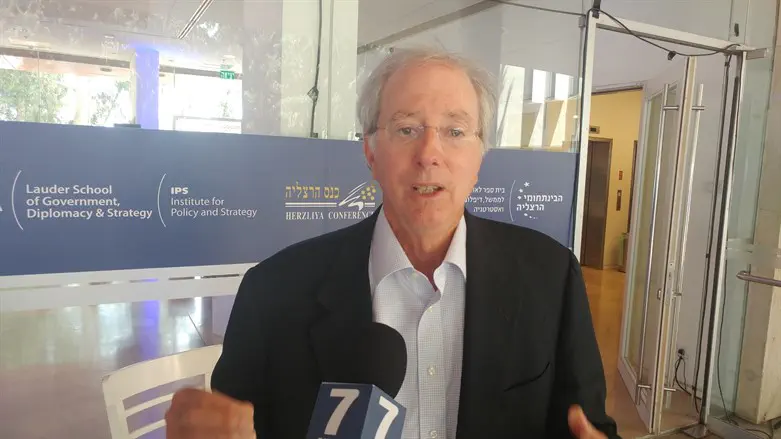by Stephen M. Flatow
For decades, State Department officials, past and present, have been offering bad advice. Years later, they admit they were wrong.
 |
| Dennis Ross Yoni Kempinski |
Twenty-five years too late, former U.S. Mideast envoy Dennis Ross has admitted that he and other Clinton administration officials were wrong to refrain from confronting Yasir Arafat’s refusal to fight terrorists.
Speaking as part of a Washington Institute for Near East Policy webinar on “Oslo at 30,” Ross said that when Palestinian Arab terrorism continued following the signing of the Oslo agreement, “our response should not have been just rhetorical, we should have said to Arafat, ‘if we don’t see you acting, we’re going to stop the process—you have to demonstrate to us that you will fight terror, you have to stop treating security arrests like it’s a revolving door’.”
But U.S. officials never said anything like that to Arafat. When he let terrorists roam free, when he gave “Jihad” speeches—they never issued more than brief, gentle rhetorical reprimands. The U.S. kept sending Arafat $500-million every year. He never suffered any consequences for his behavior—so he never had any incentive to stop it.
Ross statement is just the latest in a series of too-little-too-late confessions by U.S. officials that their approach to Israel and the Palestinian Arabs was wrong. Very wrong.
Ross previously admitted that when he was a senior aide to then-Secretary of State Hillary Clinton in 2009, he pressured Israel to let Hamas bring concrete into Gaza.
Here’s how Ross recalled that episode: “I argued with Israeli leaders and security officials, telling them they needed to allow more construction materials, including cement, into Gaza so that housing, schools and basic infrastructure could be built. They countered that Hamas would misuse it, and they were right.”
That admission came five years too late. Thanks to Ross’s pressure, Hamas built “a labyrinth of underground tunnels, bunkers, command posts and shelters for its leaders, fighters and rockets,” as Ross acknowledged. They built the tunnels with “an estimated 600,000 tons of cement,” some of which was “diverted from construction materials allowed into Gaza.” (Washington Post, Aug. 8, 2014)
Ross isn’t the only one who has done this sort of thing. Remember the case of former State Department envoy Aaron Miller and the United States Holocaust Memorial Museum.
In a 2010 op-ed in the Washington Post, Miller revealed that he was the State Department official who came up with the plan to have Arafat visit the Holocaust Museum in 1998, in order to help Arafat improve his public image.
In the article, Miller acknowledged that his plan would have meant “appropriating the memory” of the Holocaust for narrow political purposes, and therefore was “one of the dumbest ideas in the annals of U.S. foreign policy.” (Washington Post, Aug. 18, 2010) Now you tell us.
And then there’s the case of the recently-departed U.S. ambassador to Israel, Thomas Nides. In an interview with the Israeli newspaper Israel HaYom, Nides was asked about his outrageous tweet commenting on the June 20 (2023) massacre of four Israelis by Palestinian Arab terrorists.
Nides equated the Arab slaughter of innocent civilians with Israel’s anti-terrorist operation in Jenin that week. He failed to acknowledge that the victims of the massacre were Jews or that the killers were Arabs. And he lumped Israeli victims and dead Jenin terrorists together, saying that both deserved prayers and mourning.
Nine days later—when it was too late to make a difference—Ambassador Nides acknowledged to Israel HaYom: “I screwed up…it was a stupid thing to do.” Unfortunately, he then trotted out assorted excuses: “I had just returned from Los Angeles when I got word of the attack. I was shown a draft of a tweet, and I signed off on it.” Translation: “I was tired, somebody else wrote it, so it wasn’t totally my fault.” We are not impressed..
For decades, State Department officials, past and present, have been offering bad advice. They’ve been pressuring Israel for one-sided concessions, proposing risky “peace” plans that would endanger Israel’s security, and smearing Israel’s name in the international press. And then, years later, they admit they were wrong.
And yet somehow they never learn from their mistakes. In that same recent webinar, Ross condemned Jewish construction in the Israeli-controlled parts of Judea-Samaria. According to Ross, one of the major flaws of the Oslo process was that Israel has continued such construction, and “building of settlements” makes Palestinian Arabs “feel powerless,” and “seems to them to be cementing the occupation, so that discredited the peace process.”
Ross forgot one inconvenient fact: there is not a single word in the Oslo accords that prohibits Jewish construction in the territories. According to the agreements, Israel is free to build new towns, or expand existing towns, or build new homes within the borders of those towns. For Ross to suggest that Jewish construction is illegal or an obstacle to peace is an outrageous falsehood.
And it’s a reminder that some of our so-called experts, despite decades of diplomatic and other experience, still manage to misunderstand some of the most basic facts of the Arab-Israeli conflict.
Stephen M. Flatow is President of the Religious Zionists of America (RZA) He is the
father of Alisa Flatow, who was murdered in an Iranian-sponsored
Palestinian terrorist attack in 1995 and the author of A Father’s Story: My Fight for Justice Against Iranian Terror. Note: The RZA is not affiliated with any American or Israeli political party.
Source:https://www.israelnationalnews.com/news/377096
No comments:
Post a Comment